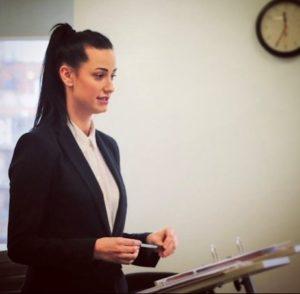Pro Bono Publico – 'For the public good'

Laurie-Elizabeth Ketley writes the next blog in our summer series where recent graduates share how their understanding of the value of pro bono legal work has developed in light of their participation in the Open Justice activities of the past year. Laurie-Elizabeth writes about working in the Law Clinic.
The identity of the legal profession boasts a distinctiveness that exudes importance. Irrespective of the intrinsic/extrinsic debate, free legal advice and representation envelops the legal profession and its identity. Pro bono work is predicated on need and it warms me to witness so many of the profession striving for equal ‘access to justice’. This is one of the reasons I wanted to become a lawyer, to craft a specialist knowledge of the law and use it to support some of the most vulnerable people within our society.
I have taken part in two pro bono projects; the Digital Justice Project and the Open Justice Law Clinic (‘OJLC’) and I thoroughly enjoyed them both. Although, this blog will only consist of my participation in the OJLC. Highlighted through my participation, was the obvious need for legal direction. Regardless of whether presented as a referral, information or direct support, clients were always eager to participate and welcomed our advice. I began to realise, what one may consider ‘common knowledge’ and take for granted, another may not. This must be appreciated and may be the difference between someone seeking recourse or being left unheard.
I conducted my first ever legal interview with a client concerning an employment dispute. I felt nervous, overcautious and questioned my ability. However, all my concerns were eased when the interview began. The client was simply grateful for the help, enthusiastic and very easygoing, making the interview process, a breeze. At times, I wondered whether the client sensed my nerves or professional infancy. Whilst it is possible and may have thought I spoke a little fast. On the whole, I think I otherwise remained composed and collected. This is a skill I require as a Barrister in conferences in the future, therefore I am grateful to have had this opportunity to hone these skills. In the future, I will be mindful of speaking slower and perhaps even draft a little reminder note attached to my computer screen, reminding me to breathe.
We also had some technical difficulties as we were conducting the interview remotely. In my OJLC diary regarding the interview, I wrote; ‘we had a lot of feedback from our microphones being on simultaneously, which made natural interactions with the client difficult’ (‘Extract 1’). This was frustrating, as it was difficult to hear the client and social cues were thwarted. The client may have felt equally exasperated with not being able to listen to what we were saying clearly, especially as his emotions are likely to be heightened as he is directly involved with the case. Unfortunately, this is likely to be the reality of the legal system and many other communications moving forward and something we all have to adapt to. Moving forward, a mock run-through beforehand to check our microphones, may aid streamlined communication and mitigate technical issues that could arise.
I initially thought of pro bono work as being undervalued. However, what I learnt through my participation, is how grateful and appreciated free legal advice is. Irrespective of technical difficulties or anything else that I considered concerning, pro bono work is pivotal in the fight for access to justice and I am overjoyed that I contributed. In the future, I wish to become a Barrister and I will certainly maintain some form of pro bono work along my legal journey and beyond. I am passionate about supporting vulnerable people that have found themselves entangled within the legal system. If every legal professional pulled together and contributed in some form, this would positively impact access to justice.
